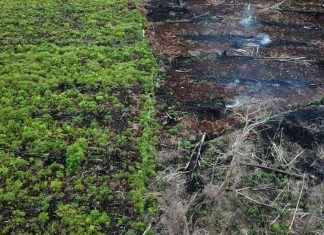Late Sunday night, gunshots were heard near the presidential residence. In the early hours Monday morning, a battle took part at the presidential palace as a helicopter flew overhead. Except for checkpoints that were heavily guarded with mutinous soldiers, the roads in the capital were unaffected Sunday night.
RTB, the state news station, was under heavy guard Monday morning.
On Sunday, fighting broke out when soldiers took over the Lamizana Sangoule military base in Ouagadougou. In a show of support, civilians marched into the town but were stopped by tear gas-wielding security forces. The mutiny occurred a day following a public demonstration calling on Kabore to resign. It was the latest anti-Kabore protest as anger mounts over the government’s handling the Islamic insurgency.
Since Sunday’s statement by Minister of Defense Aime Barthelemy Simpore to state broadcaster RTB, the government has not made any statements. Simpore said that some barracks were affected not only by unrest in Ouagadougou, but also in other cities. However, he denied that Kabore had been taken into custody by the mutineers.
“It’s only a few barracks. Simpore stated that there aren’t too many.
Since 2015, Kabore has been leading Burkina Faso’s leadership since he was elected. This came after President Blaise Compaore, a long-serving strongman, was overthrown by a popular uprising. He had been in power for almost three decades. Kabore was reelected for a fifth term in November 2020. However, frustration is growing over his inability stop the spread of jihadist violence throughout the country. Al-Qaida attacks and those linked to the Islamic State are increasing, killing thousands of people and dislocating more than 1.5 million.
Since 2016, when extremist violence started, the military has seen losses. More than 50 security personnel were killed in December in the Sahel region, while nine were killed in November in the Center North.
Angry mutinous soldiers claimed that the government had disconnected itself from the forces on the ground and that their colleagues were in danger. They also said that they wanted military rule. One of the soldiers called and said they wanted better conditions for Burkina Faso’s military in the face of the increasing fight against Islamic militants. They also demanded more manpower to fight extremists, and better care for the wounded and their families.
According to one of the mutinous soldiers, around 100 military personnel have been planning the takeover since August. He said that organizers have never met at the same place more than once and they always meet outside the capital. He said that they used messaging apps such as Signal, WhatsApp, and Telegraph to plan.
Experts in the region say that the Kabore government was stretched too thin, but it is unlikely that the mutiny will alter anything.
“Burkina Faso’s army is seriously ill-equipped, and unprepared for fighting the war it has been asked to. It is out of its depth. It is understandable that it feels frustrated with an equally out-of-its-depth government. Regrettably this (rebellion), is unlikely to improve any,” stated Michael Shurkin, a former political analysts at the CIA and director global programs at 14 North Strategies. This business intelligence consultancy based out of Dakar, Senegal has focused on West Africa’s Sahel area for 15 years.
Burkina Faso’s population already supports a takeover after the weekend protests.
People are tired of this insecurity. Every day, people are murdered. There are many areas in Burkina that cannot be accessed. “We have lost a large part of our territory,” Jean-Baptiste Ilboudou, a civilian living near the military base where gunshots could be heard, said.
The ECOWAS West African regional bloc, also known as ECOWAS in West Africa, has already suspended Mali, Guinea, and Mali over military coups.
An earlier month, authorities arrested a group soldiers suspected of being involved in a plot to overthrow the government. It wasn’t immediately clear if there was any connection between these soldiers and those who led the coup. According to military prosecutors, the plot involved nine soldiers and two civilians.
Over the last 18 months, West Africa has witnessed a series of military coups. ECOWAS suspended two member countries simultaneously for the first-time since 2012.
The democratically elected president was detained after a mutiny in a Malian military base. The junta leader in Mali refused to allow new elections for the next four years and later announced his resignation.
A military junta still in power also overthrew Guinea’s president in September 2021.
Burkina Faso has also seen its fair share of military coup attempts and attempted coups. Compaore was forced to take power in 1987. In 2015, Compaore’s loyal soldiers attempted to overthrow the new transitional government. The army managed to restore power to the transitional authorities, who led until Kabore won an electoral election and was elected into office.






